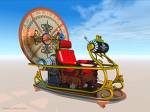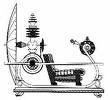Time Travel
By peizli
@peizli (1000)
Australia
12 responses
@meghdut2 (194)
• India
7 Dec 06
There is no widespread agreement on what should qualify as the first time travel story, since a number of early stories feature elements suggestive of time travel but are nevertheless somewhat ambiguous. For example, Memoirs of the Twentieth Century (1733) by Samuel Madden is mainly a series of letters from English ambassadors in various countries the British "Lord High Treasurer", along with a few replies from the British foreign office, all purportedly written in 1997 and 1998 and describing the conditions of that era. However, the framing story is that these letters were actual documents given to the narrator by his guardian angel one night in 1728; for this reason, Paul Alkon suggests in his book Origins of Futuristic Fiction that "the first time-traveler in English literature is a guardian angel who returns with state documents from 1998 to the year 1728", although the book does not explicitly show how the angel obtained these documents. Alkon later qualifies this by writing "It would be stretching our generosity to praise Madden for being the first to show a traveler arriving from the future", but also says that Madden "deserves recognition as the first to toy with the rich idea of time-travel in the form of an artifact sent backwards from the future to be discovered in the present."
In the science fiction anthology Far Boundaries (1951), the editor August Derleth identifies the short story "Missing One's Coach: An Anachronism", written for the Dublin Literary Magazine by an anonymous author in 1838, as a very early time travel story. In this story, the narrator is waiting under a tree to be picked up by a coach which will take him out of Newcastle, when he suddenly finds himself transported back over a thousand years, where he encounters the Venerable Bede in a monestary, and gives him somewhat ironic explanations of the developments of the coming centuries. It is never entirely clear whether these events actually occurred or were merely a dream—the narrator says that when he initially found a comfortable-looking spot in the roots of the tree, he sat down, "and as my sceptical reader will tell me, nodded and slept", but then says that he is "resolved not to admit" this explanation. A number of dreamlike elements of the story may suggest otherwise to the reader, such as the fact that none of the members of the monestary seem to be able to see him at first, and the abrupt ending where Bede has been delayed talking to the narrator and so the other monks burst in thinking that some harm has come to him, and suddenly the narrator finds himself back under the tree in the present (August of 1837), with his coach having just passed his spot on the road, leaving him stranded in Newcastle for another night.
Charles Dickens' 1843 book A Christmas Carol is considered by some[2] to be one of the first depictions of time travel, as the main character, Ebenezer Scrooge, is transported to Christmases past, present and yet to come. These might be considered mere visions rather than actual time travel, though, since Scrooge only viewed each time period passively, unable to interact with them.
A clearer example of time travel is found in the popular 1861 book Paris avant les hommes (Paris before Men), published posthumously by the French botanist and geologist Pierre Boitard. In this story the main character is transported into the prehistoric past by the magic of a "lame demon", where he encounters such extinct animals as a Plesiosaur, as well as Boitard's imagined version of an apelike human ancestor, and is able to actively interact with some of them. Another clear early example of time travel in fiction is the short story The Clock That Went Backward by Edward Page Mitchell, which appeared in the New York Sun in 1881.
The first time travel story to feature time travel by means of a time machine was Enrique Gaspar y Rimbau's 1887 book El Anacronópete. This idea gained popularity with the H. G. Wells story The Time Machine, published in 1895, which is often seen as an inspiration for all later science fiction stories featuring time travel.
Since that time, both science and fiction (see Time travel in fiction) have expanded on the concept of time travel, but whether it could be possible in reality is still an open question.
Some theories, most notably special and general relativity, suggest that suitable geometries of spacetime, or specific types of motion in space, may allow time travel into the past and future if these geometries or motions are possible.[3] Concepts that aid such understanding include the closed timelike curve.
Although the possibility of traveling to the future by moving at relativistic velocities is taken for granted by physicists, many in the scientific community believe that backwards time travel is highly unlikely. Any theory which would allow time travel would require that issues of causality be resolved. What if one were to go back in time and kill one's own grandfather (see grandfather paradox)? Additionally, Stephen Hawking once suggested that the absence of tourists from the future constitutes an argument against the existence of time travel—a variant of the Fermi paradox, with time travelers instead of alien visitors (but Hawking noted elsewhere that time travel may only be possible in a region of spacetime that is warped in the right way, and that if we can't create such a region until the future, then time travelers would not be able to travel back before that date, so 'This picture would explain why we haven't been over run by tourists from the future.'[4]) However, the theory of general relativity does suggest scientific grounds for thinking backwards time travel could be possible in certain unusual scenarios, although arguments from semiclassical gravity suggest that when quantum effects are incorporated into general relativity, these loopholes may be closed. These semiclassical arguments led Hawking to formulate the chronology protection conjecture, suggesting that the fundamental laws of nature prevent time travel, but physicists cannot come to a definite judgment on the issue without a theory of quantum gravity to join quantum mechanics and general relativity into a completely unified theory.
Presentism holds that neither the future nor the past exist; that the matter of the universe only exists in the present moment, that time is merely a concept of man used to describe what is going on around him. This could be interpreted to mean that there is nowhere for a time traveller to go, thus rendering the whole topic of time travel null and void. However, some presentists argue that although past and future objects do not exist, there can still be definite truths about past and future events, and that it is possible that a future truth about the time traveler deciding to return to the present date could explain the time traveler's actual presence in the present.[5] In any case, the relativity of simultaneity in modern physics is generally understood to cast serious doubt on presentism and to favor the view known as four dimensionalism (closely related to the idea of block time) in which past, present and future events all coexist in a single spacetime.

@peizli (1000)
• Australia
7 Dec 06
Ok I have read it now. That was very interesting. I was listening to the radio yesterday and they were having conversation about timetravel and that it was being experimented right now, it would be interesting to see if it could be pulled off. Thanks again for this post.

@zeeterman (1066)
• United States
7 Dec 06
Both. Why limit yourself? I'd want to go back in time to witness great moments in history, but not change history.
My time in the future would be brief. I don't wanna know when I die or anything like that. Just a few lottery numbers and sports scores to bring back with me. Might as well change my destiny in the present!

@peizli (1000)
• Australia
7 Dec 06
Yeah, you couldn't resist going both ways, lol. I wonder whether it would get addictive going back in time, so many great historical moments. Lottery numbers would be handy, some people might get too greedy. So I'll have to make it one trip only either way!
2 people like this

@caramello (4377)
• Australia
7 Dec 06
That is a hard question peizli, the future at the moment is not looking too good unless there is a dramatic change, so I would have to say back, "If I could turn back time?" not a bad song, wonder where I have heard it before? lol
1 person likes this
@juicemilk (2283)
• Australia
7 Dec 06
well....as you said above I wou ld be scared of changing something in the future if I went back into the past. So I would choose future, actually I dont know if I would use it...it would be too weird lol
could mess you up for life!
1 person likes this
@september_1st (3209)
• Romania
7 Dec 06
Back, i've allways been fascinated by the times when Jesus was alive!
1 person likes this
@brendalee (6082)
• United States
7 Dec 06
That depends on whether I would have to come back or not. If I didn't have to come back to the present I would say that I would rather go back in time and change some things that happened,stupid things I did. And I only need to go back to about March of this year. Are you going to get busy and make that time machine for me peizli?lol
1 person likes this
@BELMCstar (1341)
• Australia
7 Dec 06
I would prefer to go forward to see what I could do to stop myself from getting into trouble, and then changing it.
I would also like to find out the lottery numbers, and make sure I was the only one with the right numbers to make sure I won by myself.
@ossie16d (11821)
• Australia
20 Dec 06
This is a bit scary peizli and I am not too sure which I would prefer. For instance going back in time might mean a lot of cringing when I see what all the things I did and said during my mis-spent youth. However on the other side of the coin, I might get an opportunity to do some things a little better second time around. LOL
To go further back than that might not suit me at all because I am not sure that I am tough enough to withstand the rigours they had to in those times. Going forward could be interesting but only if I could pick and choose what I was to see. For instance I don't want to know when and how I will die but would like to see my grandchildren (if I ever have any that is) and what they become. Also having the lotto numbers would be good, even it the numbers are for the night I die, as long as I have a ticket in it. :)
Now I am completely and totally confused - and it has nothing to do with old age either - so I will hedge my bets and say PLEASE, can I do both of them?
@yes2day (173)
• Australia
7 Dec 06
I think it would depend on how accurate this time machine was, is a swiss time machine perhaps, I hear they aremore accurate, te-he. But in answer bach first, hide all the loot and then forward to make sure I didn't get busted when I miraculously found it.
@shivendran (219)
• India
8 Dec 06
I would go back to the past.to my school days.jus think of that nofears,no tears,Back with old friends,Chatting,full of simple nothings.Oh! I would love to..!!Pls do invite me if you get the machine.?/@!


















